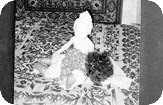|
 Battle Field, 1999-2000, photographs
Battle Field, 1999-2000, photographs
Photographs exhibited by Anton Olshvang are a kind of a peep-show
which through private snapshots takes us into the intimate
world of contemporary Russian everyday life. These shots belong
to that perishable amateur type of photography which has no
chance of surviving the generation it depicts. The artist
found the exhibited shots in small photo labs from across
the states of the former Soviet Union. They all come from
the numerous ranks of "abandoned" photographs, rejected by
customers due to some technical imperfection. During the stage
of project preparation and photograph selection, the artist
did not look for unusual pieces. On the contrary, he focused
on the most typical examples and created some kind of a collective
family album of contemporary Russia. From the mass of accumulated
images, the monolithic structure of a former common culture
emerged, which was not a system of shared values but a product
of the collective subconscious. According to Olshvang, he
wished to minimise his role as an artist, therefore completely
equating the exhibited work of art with the material from
which it is made. He attempts to present the spirit of a certain
time and space, a recycling of a culture and an understanding
of a curious blend of beauty and horror, of humanity and inhumanity
emanating from the photographs. Olshvang's "rejected" shots
feature two conflicting characteristics - they are as "normal"
as the life they depict, but in this banal reality, they are
crippled and deformed because of their technical imperfections
(blurred image, incorrect use of the flash, unusual colours).
We are faced with an involuntary "avant-garde" of family photography
which would have ended up in a trash bin if it had not been
exhibited on the gallery walls. Because of his interest in
the curious destiny of unwanted objects, the artist plays
the role of a "good-natured vulture", hunting after "dead
bodies" and "not yet" dead images, and crosses the boundary
of the private and invades the intimate world of his soldiers.
His approach evokes the memory of the ancient fear of the
image as a double which takes possession of the sitter's soul.
Like Gogol's Chichikov, Olshvang collects souls which in contemporary
Russia are rejected by their owners.

|
|

